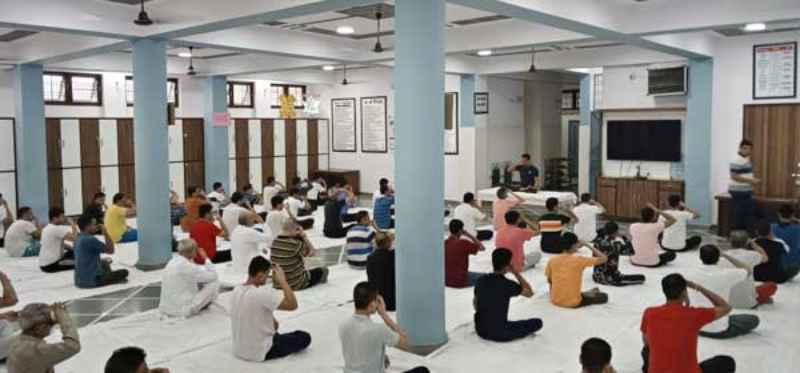Apart from alcohol, substances like tobacco, opioids, cocaine, hallucinogens, cannabis, or prescribed medications can also lead to addiction. These can manifest differently from person to person due to various underlying factors.
Addiction cases in India are on the rise; therefore, it is essential to have access to resources like addiction rehabilitation centres and proper knowledge about the nature of the condition to reduce symptoms and enhance overall well-being.
What is Addiction?
Addiction is a mental health condition characterised by the inability to carry on with daily activities without the continuous consumption of substances, which impairs both daily functioning and social life.
Not everyone possesses the same ability to manage negative emotions such as rejection, sadness, fear, or anger. Some people struggle to handle these emotions and turn to substances to escape or avoid them rather than face them.
Many addicts are aware of the adverse effects substances have on their physical, mental, and emotional well-being, yet their urge to consume overpowers their health, leaving them unable to control it regardless of the day or time, thereby hindering every aspect of their lives.
Causes of Addiction
- Various factors fuel the onset of addiction in a person, like
- Pre-existing mental health conditions like anxiety, depression, panic disorder or personality disorder.
- Certain people, places, objects, and situations can trigger cravings by linking them to negative emotions.
- Boredom leads to trying out new things instead of indulging in healthy activities.
- Stress from any conflict with family members or close person and having a family history of addiction problem.
- Inability to manage negative emotions.
Types of Therapy Offered at Addiction Rehabilitation Centres
The efficacy of the following therapies can depend on the individual’s severity level and unique symptoms. Therefore, it is crucial to assess your condition thoroughly by an experienced mental health professional.
Cognitive Behavioural Therapy (CBT)
CBT is one of the most popular and effective behavioural therapies for treating addiction because it not only traces your negative thought process and ideas that fuel your harmful behaviour, but it also transforms them into healthier ones by teaching each individual to challenge. You will be able to understand the relationship between your thinking patterns and behaviours better.
Motivational Interviewing (MI)
Motivational Interviewing (MI) assists individuals in navigating confusion and boosting their motivation for change. It utilizes techniques such as empathy, open-ended questions, affirmations, reflective listening, and summarizing.
It is often used with other therapies, to engage and encourage each individual to continue their treatment and focus on progress.
Dialectical Behavioural Therapy (DBT)
Some people have a hard time accepting that they are an addict. Therefore, DBT encourages each individual to accept their reality, helps them understand their behaviours and equips them with tools to change these unhealthy behaviours through mindfulness exercises, building problem-solving skills and emotion-regulation procedures in a safe environment.
Family Counselling
The essence of family counselling is to incorporate family members into the sessions to better understand the nature of your condition and the different challenges associated with it. A therapist will equip family members with the right techniques to enhance your recovery journey. They will also be providing self-care tips and other support since addiction affects everyone.
Medication at Addiction Rehabilitation
Medications have certain side effects; therefore, they are rarely the first line of choice of treatment. However, drugs like Disulfiram or Acamprosate have a track record of helping individuals with addiction issues and improving the overall treatment process, so a mental health professional might prescribe them.
Different Programs at Addiction Rehabilitation Centre
Starting a recovery journey can be daunting because of stereotypes and a lack of proper representation in the popular media. Rehabilitation centres offer various treatment options in structured environments, aiming to provide long-term recovery without judgment. Rehab programs include:
Detoxification
Medically supervised detoxification programs are employed by rehab centres to address the problems associated with withdrawal and treatment adherence. These programs are intended to successfully manage symptoms of withdrawal and get individuals ready for the next phases of their recovery process.
Therapy and Counselling
A range of treatment modalities are available in rehab facilities, such as family counselling, motivational interviewing (MI), dialectical behaviour therapy (DBT), and cognitive behavioural therapy (CBT). Based on evaluations conducted by mental health specialists, these therapies are tailored since it is understood that every person has different symptoms and needs specialised approaches.
Educations
Education is a vital part of treatment because it gives people a better knowledge of their addiction and the difficulties they are facing. Professionals offer techniques for controlling triggers and averting relapses, giving people the tools they need for sustained recovery.
Support Group
Rehab facilities can also include support groups offering therapeutic sessions and group gatherings for people to interact with others who have gone through similar challenges. This social element facilitates sharing tips, control cravings, and a fight against the loneliness that addiction frequently brings.
Aftercare Program
Programs for aftercare are crucial for sustaining healing after therapy concludes. These programs aim to avoid relapse and encourage ongoing recovery by managing triggers in real-world circumstances, supporting therapy outside of the institution, and reinforcing the success accomplished during rehab.
Addiction recovery is challenging but is possible with the right support system and correct treatment approaches. Opening up to your trusted person and letting them know about your needs can be a great way to start your recovery journey. Seeking addiction experts’ help at addiction rehabilitation centres has a profound impact on becoming a healthier and happier you.
ALSO READ: How to use pumpkin seed oil for hair growth (Best Tips)
ALSO READ: How to Optimize Your Lifestyle with Advantages of Home Automation
